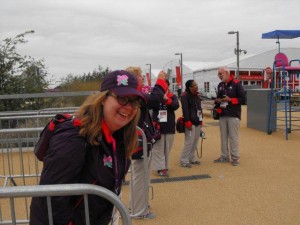If only more people had the chance to develop in confidence like Laura Minett.
Laura, who I interviewed for a Guardian social care piece today, works as an expert by experience. Her part-time role through the charity which supports her, Choice Support, means monitoring and inspecting social care services on behalf of social care watchdog the Care Quality Commission. The self-assurance she has developed thanks to the job means that when I misspelt her surname during our interview, she politely – but firmly – asked for my pen so that she could write it out for me herself.
Laura, who has a learning disability, told me she is driven by helping improve support for people who may be less independent than her. As she says in today’s piece in the Guardian: “I like getting out and about meeting people and thinking ‘maybe that’s good maybe that’s bad’. I like having a job and talking to the service users – it’s about their quality of life.”
The views of people who use social and health care services are so often not taken into account, something which a major inquiry into health treatment of people with learning disabilities found this week. Involving people who use services in improving the health and social care sector is vital, but so often consultation is nothing more than lip service.
Not so with the experts programme it seems. Another expert I met, Laura Broughton, stressed that paid work and the recognition that her opinion is valuable has made a huge difference to her life. Both the experts explained they have spotted things that could be improved in residential care (simple things, even, like offering people a better choice of food and drink) and told me that individuals in care tell them their concerns or wishes much more freely than they would a professional or full-time inspector without their personal experience.

She has been an expert for just two years, but already speaks in public and to social care professionals about her role. She walked into our meeting relaxed and confident. “I was quite different before doing this,” Laura told me. “I’d never had job before, certainly not in offices, I was more shy. Now I’ve done the experts work, Choice Support is getting me involved in slightly different things as well. I’m training [Choice Support staff and CQC inspectors] and have done presentations and workshops. It’s exciting…I’m travelling quite a lot and getting to know the country.”
Here is some more from the two experts in their own words, which both women previously shared on the CQC and Choice Support websites.

I work with different inspectors and have already visited lots of different services like hospitals, a residential college, care homes, assessment and treatment units and secure units. I have recently been part of inspection teams involved in the National Review of Learning Disability services.
My main job is to find out about people’s experiences of the care they receive. The inspector tells me which of the 16 outcomes I need to prepare questions on to ask on the inspection. We arrange a meeting time for the day and go to the service unannounced. This means the provider doesn’t know we are coming. I use my experience to find out what they think about the care they are getting and if it is good enough for each individual using the service.”

Working as part of a team with inspectors was exciting. The work was exciting but difficult too. Sometimes some of the places I visited were not pleasing , they were challenging.
Some of the people I met should have more help in getting a better life. They were often bored and distressed and staff talked to them not as adults but as though they were children. Some of the people weren’t treated as individuals and certainly not in a person centred way. I felt some people didn’t get the opportunities they should have because they couldn’t speak or because others felt their behaviour was challenging.
It was good for me because I’m now a lot more confident, I’ve got a paid job as an Expert by Experience. Having a paid job is new for me as it is with a lot of people who have a learning difficulty.
I have a voice and I was able to help other people living in these services to have a voice.
I hope things will change. All people who have a learning disability have the right to good safe services, choices and a good life.”
